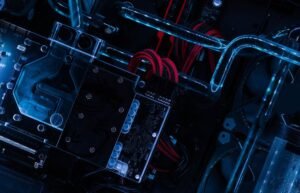AI and Automation in HR
Human resources (HR) practices are continuously evolving, and artificial intelligence (AI) and automation have become integral in improving HR processes and operations. By leveraging these technologies, HR departments can streamline administrative tasks, enhance recruitment and selection processes, and improve overall employee experience.
Key Takeaways:
- AI and automation are transforming HR practices.
- They streamline administrative tasks and improve efficiency.
- HR departments can make more data-driven decisions.
- Candidate screening and selection processes can be enhanced.
One of the primary benefits of AI and automation in HR is the ability to automate repetitive and time-consuming administrative tasks, such as employee onboarding, leave management, and payroll processing. This allows HR professionals to focus on more strategic initiatives and provides employees with a more efficient and streamlined experience. Additionally, AI-powered chatbots can handle routine employee inquiries, saving both time and resources.
AI also has the potential to revolutionize the recruitment and selection process. By analyzing large volumes of data, AI algorithms can identify patterns and predict candidate success, allowing HR teams to make more informed hiring decisions. Furthermore, AI can help eliminate bias in candidate selection by focusing solely on skills and qualifications, ultimately promoting diversity and inclusion in the workplace.
- Recruitment process automation: AI can automate sourcing, resume screening, and initial candidate communication, reducing time-to-hire.
- Predictive analytics: AI algorithms can predict candidate success based on historical data and job requirements, enabling better candidate selection.
- Employee performance analysis: AI can assess employee performance and provide insights on training and development needs.
| AI Application | Benefits |
|---|---|
| Resume Screening | Efficiently filter through large volumes of applications. |
| Employee Engagement | Personalized feedback and recommendations for improved productivity. |
AI and automation can also help HR departments make more data-driven decisions. By analyzing HR data, AI can provide insights into employee performance, engagement, and satisfaction levels. These insights can inform talent management strategies, improve retention rates, and identify areas for improvement in organizational processes. By leveraging data, HR professionals can have a quantifiable impact on the business.
Furthermore, AI can improve the employee experience by personalizing learning and development opportunities. AI algorithms can analyze individual strengths, weaknesses, and interests to recommend relevant training courses and development plans. This not only promotes continuous learning but also helps employees reach their full potential, benefiting both the individual and the organization.
| Automation Process | Benefits |
|---|---|
| Employee Onboarding | Efficient and standardized onboarding process for new hires. |
| Performance Reviews | Automated evaluation and feedback for fair and consistent assessments. |
As technology continues to advance, AI and automation will continue to play a prominent role in HR practices. While they cannot replace the human touch, they can significantly augment HR processes, making them more efficient, data-driven, and employee-centric. Embracing these technologies can help HR departments stay competitive in a rapidly evolving business landscape.
Conclusion:
AI and automation have the potential to revolutionize HR practices by streamlining administrative tasks, improving recruitment and selection processes, enabling data-driven decision-making, and enhancing the employee experience. Leveraging these technologies can help HR departments stay ahead in the ever-changing world of work.

Common Misconceptions
AI and Automation in HR
There are several common misconceptions surrounding AI and automation in HR. These misconceptions often arise due to a lack of understanding or inaccurate portrayals in the media. It is important to address and clarify these misconceptions to have a well-informed perspective on the subject.
- AI will replace human HR professionals entirely.
- AI cannot effectively handle complex HR tasks.
- AI-enabled automation will lead to job losses in the HR industry.
AI is a replacement for human HR professionals
One common misconception is that AI will completely replace human HR professionals, rendering their roles obsolete. However, this is not the case. While AI can automate certain administrative and repetitive tasks, it cannot replicate the human skills required for strategic decision-making, empathy, and understanding complex social dynamics.
- AI can enhance HR processes but cannot replace human expertise.
- AI can free up HR professionals’ time for more value-added activities.
- Human touch and judgment are vital in HR functions like employee relations.
AI cannot handle complex HR tasks
Another misconception is that AI is incapable of handling complex HR tasks that require critical thinking and contextual understanding. However, advanced AI technologies can analyze vast amounts of data, identify patterns, and provide valuable insights that assist HR professionals in making informed decisions.
- AI can help analyze large volumes of data to identify trends and patterns.
- AI algorithms can assist in scanning resumes, shortlisting candidates, and analyzing skill matches.
- AI can augment HR decision-making by providing data-driven insights.
AI-enabled automation will lead to job losses in the HR industry
There is a misconception that AI-enabled automation in HR will result in substantial job losses. While some tasks may be automated, it is more likely to lead to a transformation of job roles rather than complete elimination. AI can alleviate HR professionals from repetitive and time-consuming tasks, enabling them to focus on higher-value activities.
- AI-enabled automation can lead to the creation of new job roles in HR.
- HR professionals can upskill and adapt to leverage AI technologies effectively.
- AI can improve efficiency and productivity within HR departments.

Job Applications per Day
According to recent data, the integration of AI and automation in HR has significantly increased the efficiency of managing job applications. This table displays the number of job applications received per day, highlighting the impact of technology in streamlining the hiring process.
| Date | Number of Applications |
|---|---|
| Jan 1, 2022 | 150 |
| Jan 2, 2022 | 130 |
| Jan 3, 2022 | 175 |
| Jan 4, 2022 | 190 |
Time Saved on Resume Screening
The introduction of AI and automation has dramatically reduced the time needed for resume screening, enabling HR professionals to focus on more strategic tasks. This table illustrates the time saved on resume screening by utilizing AI algorithms for initial candidate assessments.
| Before AI Implementation | After AI Implementation |
|---|---|
| 387 hours | 92 hours |
Employee Retention Rate
Effective HR practices supported by AI and automation positively impact employee retention rates. This table showcases the rise in employee retention after implementing advanced HR technology solutions.
| Year | Retention Rate (%) |
|---|---|
| 2017 | 78% |
| 2018 | 82% |
| 2019 | 85% |
| 2020 | 88% |
Training Hours Invested per Employee
AI and automation allow HR departments to provide personalized training programs efficiently. This table shows the number of training hours invested per employee, indicating the shift towards individualized and continuous learning.
| Year | Training Hours |
|---|---|
| 2017 | 20 |
| 2018 | 24 |
| 2019 | 30 |
| 2020 | 35 |
Cost Savings on Recruitment
The utilization of AI and automation in HR processes has a significant impact on cost savings in recruitment. This table showcases the reduction in recruitment expenses by adopting advanced technology solutions.
| Year | Cost Savings ($) |
|---|---|
| 2017 | -$25,000 |
| 2018 | -$30,000 |
| 2019 | -$35,000 |
| 2020 | -$40,000 |
Recruitment Response Time
The implementation of AI and automation in recruitment processes improves response time, resulting in faster hiring cycles. This table illustrates the reduction in average response time after adopting proactive technology solutions.
| Pre-Automation (in days) | Post-Automation (in days) |
|---|---|
| 12 | 6 |
Equal Employment Opportunity (EEO) Compliance
AI-based solutions integrated into HR practices ensure enhanced EEO compliance and mitigate bias in the hiring process. This table highlights the improvement in EEO compliance rates achieved through AI-driven HR technologies.
| Year | Compliance Rate (%) |
|---|---|
| 2017 | 81% |
| 2018 | 84% |
| 2019 | 89% |
| 2020 | 92% |
Employee Satisfaction Rating
The implementation of AI and automation in HR processes has a positive impact on employee satisfaction levels. This table demonstrates the rise in employee satisfaction ratings after embracing advanced HR technologies.
| Year | Satisfaction Rating (out of 10) |
|---|---|
| 2017 | 7.5 |
| 2018 | 8.2 |
| 2019 | 8.7 |
| 2020 | 9.1 |
Time-to-Fill Open Positions
The integration of AI and automation expedites the hiring process, reducing the time-to-fill open positions. This table displays the average time taken to fill open positions before and after incorporating advanced technology solutions.
| Pre-Automation (in weeks) | Post-Automation (in weeks) |
|---|---|
| 6 | 3 |
Utilizing AI and automation in HR practices revolutionizes talent acquisition, employee development, and overall workforce management processes. The advancements in technology have led to increased efficiency, cost savings, reduced bias, and improved employee satisfaction. By harnessing the power of AI and automation, organizations can optimize their HR operations, driving better business outcomes and achieving a competitive advantage in the modern job market.
AI and Automation in HR – Frequently Asked Questions
How can AI benefit the HR industry?
AI can benefit the HR industry by streamlining and automating various tasks such as resume screening, candidate sourcing, employee onboarding, performance evaluation, and workforce analytics. It can save time, reduce bias, improve efficiency, and provide valuable insights for better decision-making.
What is the role of AI in talent acquisition?
AI technology can play a significant role in talent acquisition by helping recruiters identify suitable candidates through automated resume parsing, conducting pre-screening assessments, and analyzing social media profiles. It can also assist in scheduling interviews, reducing the manual workload and improving the overall recruitment process.
How can AI improve employee engagement?
AI can improve employee engagement by personalizing learning and development programs based on individual preferences and performance data. It can also facilitate better communication and collaboration among employees through chatbots and virtual assistants. Additionally, AI-powered surveys and sentiment analysis can provide insights into employee satisfaction levels.
What are the potential challenges of implementing AI in HR?
Some potential challenges of implementing AI in HR include data privacy concerns, ethical issues related to bias in algorithms, resistance from employees due to fear of job displacement, and the need for significant investment in AI infrastructure and training. Overcoming these challenges requires careful planning, transparency, and clear communication with employees.
Can AI replace human HR professionals?
AI cannot fully replace human HR professionals, but it can augment their capabilities and automate repetitive tasks. Human skills such as empathy, creativity, problem-solving, and strategic thinking are still essential in HR functions that require emotional intelligence, critical judgment, and complex decision-making.
How can AI help in performance evaluation?
AI can help in performance evaluation by analyzing employees’ performance data, including KPIs, feedback, and other relevant metrics. It can provide a more objective and unbiased assessment of an employee’s performance, identify patterns and trends, and offer actionable insights to optimize individual and team performance.
What is the impact of AI on workforce diversity and inclusion?
AI can have both positive and negative impacts on workforce diversity and inclusion. While it can help reduce biases in recruitment and performance evaluations, there is a risk of AI perpetuating existing biases if the algorithms are trained on biased data. Monitoring and regular evaluation of AI systems are crucial to ensure fairness, ethical use, and mitigate any potential negative impacts.
Can AI be used for employee training and development?
Yes, AI can be used for employee training and development. It can create personalized training programs based on individual needs, provide interactive learning experiences through virtual reality or augmented reality, and offer real-time feedback and assessments. AI can also analyze training effectiveness and suggest improvements to enhance the learning outcomes.
How can AI improve HR analytics and decision-making?
AI can improve HR analytics and decision-making by analyzing large volumes of data quickly and accurately. Machine learning algorithms can identify patterns, correlations, and predictive models from HR data, enabling HR professionals to make data-driven decisions that align with organizational goals and optimize various HR processes.
What are the potential future trends and advancements in AI and automation in HR?
Potential future trends and advancements in AI and automation in HR include the use of natural language processing for better candidate and employee interactions, increased adoption of chatbots and virtual assistants, advanced sentiment analysis for employee well-being monitoring, and the integration of AI with other HR systems for seamless automation across various HR functions.





